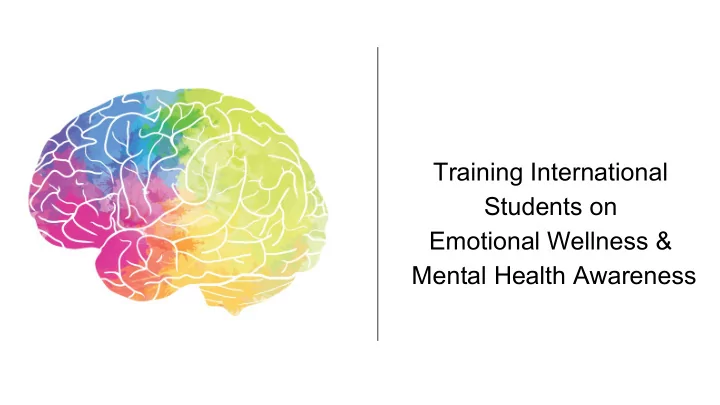

Training International Students on Emotional Wellness & Mental Health Awareness
Presenters Thom Julian Sutherland Beever Dawn Adams Director of Student Conduct and Marketing Manager & Licensed Director of International Community Standards Insurance Agent Student Services
Agenda ● What’s Going On With Our Students? ● Understanding the Challenges International Students Face ● Overcoming these Challenges ● Programming That Works ● Resources ● Q&A
What’s Going On With Our Students? 61% of students felt 40% of students so depressed they found it “overwhelming anxiety” “difficult to function” Source: American College Health Association
Mental Health Need, Awareness, and Use of Counseling Services Among Graduate Students 79% 61% 56% 36% 33% 17% Source: Journal of American College Health
Understanding the Challenges
Culture Impacts All Aspects of Illness • Generating symptoms • Expression of symptoms outwardly or inwardly • Coping • Where to seek care • Management of symptoms • How they seek help
Common Issues Second Language Anxiety Communication Styles Daily routine Verbal v. non-verbal Communicating with professors and classmates High-context vs. low-context Coordinating a living situation Asking for help Identity Career Planning Acculturation Finances Social class Area of study Race Planning Discrimination Political Oppression Interpersonal Academic Boundaries Formal vs. informal classroom Cultural differences in relationships Presentation styles Peer pressure Outcome vs. process oriented Parental expectations
Barriers To Treatment • Lack of mental health literacy • Unaware of services • Language barriers • Role of psychiatry in other cultures • Stigma (Family & friends) • Location of counseling center • US therapists lacking cultural understanding • Lack of support
Common Myths “Counseling is for crazy people.” “I could lose my student visa.” "Everyone will know “I can handle my own mental health problems. I saw a counselor.” If I can't, that means I'm weak.”
Overcoming the Challenges
Supporting Your Students Regular Check-Ins ● Help identify students who may be struggling (Starfish, BIT meetings) ● Noticeable changes in dress, appearance, demeanor may imply a student needs help ● Make yourself available to talk (access 24/7) Internal Training ● Know and understand your school’s protocol with responding to students in distress ● Be conscious of when to connect students to additional resources, like the counseling center ● How to listen actively, empathetically, and without judgement and when possible, have a personal hand-off to other offices ● Create strong collaborations between campus offices (ISS, Counseling Services, ADWE, CSS, CGE, Student Conduct Office) to communicate common goal of wellness
Supporting Your Students If a student does need to talk ● Demonstrate empathy ● Paraphrase what a student has said, to ensure you’re understand correctly ● Ask open ended questions ● Be clear about what you do and don’t have to report to the Title IX coordinator ● Consider student’s reaction when responding ● Consider how you will handle discomfort delivering/receiving information ● Don’t avoid because it’s uncomfortable (ex: suicide) ● Be positive ● Understand when a student should be directed to counseling services ● Understand limits of confidentiality
Raising Wellness & Awareness
Mental Health Discussions During Orientation ● Inform students of challenges and cultural adjustment - help them understand they aren’t alone ● Include testimonials from current students about homesickness, culture shock, stress, anxiety, and depression ● Try to incorporate quotes about acceptance of mental health and counseling (like “Common Myths”) ● Mention any support groups/medical practitioners who speak other languages ● Explain available counseling services, friends and roommates may need support
Mental Health Discussions During Orientation ● Invite counseling center or other mental health professionals to introduce mental health service ● Discuss what to expect when students visit the counseling center ● Provide print material from the counseling center, if possible These offices are also great to mention: ● Ombudsperson Office ● Dean of Students ● Child and Family Studies on campus ● Chapel and community religious/spiritual support centers ● Alcohol, Drug and Wellness Education Office
On Campus Programming • Buddy/Peer mentor programs (Raider Pals) • Workshops (e.g., “Decoding U.S. Culture”, “Lost in Translation”, “Culture Shock”) • “Let’s Talk” Drop-in Hours • University 101-type courses • Social organizations/student clubs (AIS) • Summer/Holiday programs • Friendship family programs (Community Friends) • Discussion/Support Groups • Creative initiates (e.g., “Welcome to My World Photo Exhibition”) • Weekend activities to get students off campus (Amish Country, Food Tours, Shopping Trips)
Programs that Work ● Destress Fest ● Mocktails ● Therapy Animals ● Drop-In Hours at various campus locations ● Collaborations with Chaplain and Counseling Services ● Activities at the Nature Center ● Weekend Community Service opportunities
Marketing Your Program How many of your international students want to go to a special event where they are going to talk about mental health? Instead, think about ways to approach the topic indirectly: Making friends in the US ● ● Managing stress ● Time management ● Eating healthy ● Staying fit on campus
Marketing Your Program
Resources
Emotional Wellness Training
Mental Health Awareness Video https://www.internationalstudentinsurance.com/explained/mental-health-video.php
Additional Resources NAFSA Resources: ● Crisis Management in a Cross Cultural Setting: ISSS ● Addressing Mental Health Issues Affecting EA Participants ● Mental Health Issues and International Students Other Resources: ● Massachusetts General Hospital Center for Cross-Cultural Student Emotional Wellness (CCCSEW)
Additional Resources National Suicide Prevention 1-800-273-TALK The Trevor Project (LGBTQ) 1-866-4-U-TREVOR Crisis Text Line Text “home” to 741-741
“International students who reported a more functional relationship with their advisors were less likely to report having an emotional or stress-related problem in the past year.” Source: Journal of American College Health
Recommend
More recommend